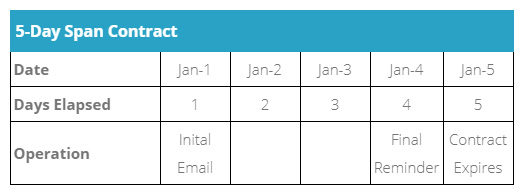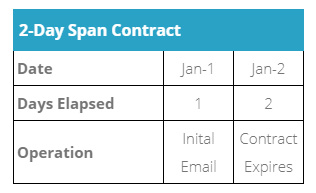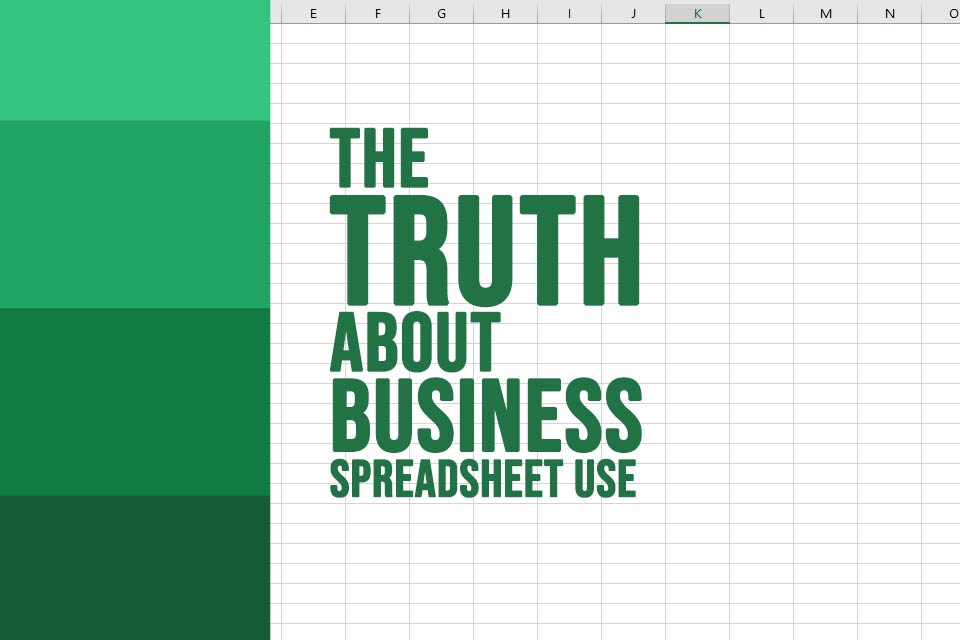One of the issues with legal documents is getting people to spend the time to review and ultimately sign them. Unless you’re a lawyer, this process is generally not a fun one. We recognized this issue and decided to look through the population of contract data to see what the general tendency of a contract recipient was.

- 90% of users signed the contract right away or later in the lifespan of the contract.
- 10% of users failed to sign the contract letting it expire.
- Additionally, of the 10% that let their contracts expire, only 20% didn't continue with a contract, while the other 80% signed a new contract later.
Now these stats might not seem bad, but for every expired contract, there is some work that needs to be done. For example, contacting the client to make sure they are still interest in the deal, creating a new contract with updated dates and potential new contract wording, etc.
You unfortunately can’t use the existing contract in a situation like this because the dates and terms are solidified in a legally binding document. A contract sent to a customer is purposefully permanent and cannot be modified. This is to prevent any party from modifying a contract without the other party knowing.
So how do you get these 10% of users to sign their contracts on time so you don’t have to change your contract? Our answer was to remind them!
You might be thinking, “Oh so you’re going to spam and annoy the customer to sign, right?”. Absolutely not! Like you, we hate spam email, high pressure sales, and any uncomfortable business tactics. So, we built a reminder system that… oddly, tries its best to not remind customers unless it really has to. Here’s how it works:
Each contract has 2 dates configured by the Node14 user:
- The date the contract was sent.
- The date the contract expires.
We first calculate the span of these dates in days and layout a schedule for reminding the customer. By default, the system is configured to send an email to the customer when first sent for signature. Additionally, the system attempts to remind the customer potentially 2 more times; Once at the half way point, and also the day before the contract expires. Here’s a typical 14-day span contract:

Here the client is emailed on the 1st, 7th and 13th days of the contract span, giving them a comfortable time to review and sign. However, there are some special safe guards in place to make sure the customer doesn’t get annoyed with the process. See the below examples of various day span contracts:

Here the contract reminder process skips the half way reminder on the 3rd day, because the next day the client would receive another reminder. The process is designed in such a way that there should always be at least a 1 day gap in between emails. We favor the "Final Reminder" email over the "Half Way" here to make the initial email time span feel as comfortable as possible.
It should be noted that via the Node14 interface, you can resend a contract as many times as you want to a customer, but Node14’s automated reminder process only sends a potential max of 2 emails. This reminder process goes one step further in preventing redundant emails with a 2-day span contract.

Here the contract reminder process skips both the half way and final reminder emails. There are several reasons for this.
- The client already received an email on the first day.
- There is no halfway day to send a halfway day reminder.
- The final reminder which normally sends the day before the contract expires is technically the first day in which the customer was already emailed. The system skips this to prevent sending a redundant and annoying email.
After completing this project and letting it run for a while, we found that the initial 10% of contracts that were expiring, went down to 1.5%. The results were immediate.

- 98.5% of users now signed the contract right away or later in the lifespan of the contract.
- 1.5% of users still failed to sign the contract letting it expire.
So why are we telling you all this? We want you to know that the level of detail and thought that went into this feature is applied throughout the entire Node14 platform. Node14 contains many features and modules and you can expect this level of quality system wide. Additionally, we want to point out that while other systems might accept the initial 10% expiration rate an acceptable number, Node14 was dedicated to provide more performance from an already successful process for no additional cost to you.
If you need a custom business database that is infused with this level of care, speak with Node14 today!
You Might Also Like This Article:
The TRUTH About Running Your Business On Spreadsheets
Do you run your business on spreadsheets? Learn the true facts, upsides, downsides and solutions to business spreadsheet use.
Read More ⟶